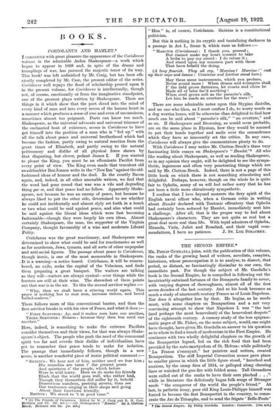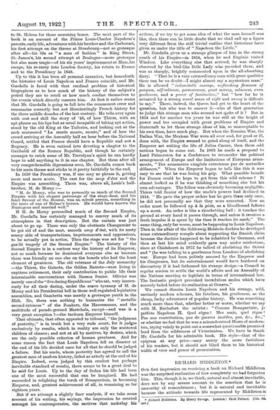THE SECOND EMPIRE.*
Mn. Thmse GUEDALLA joins, with the publication of this volume, the ranks of the growing, band of writers, novelists, essayists, historians, whose preoccupation it is to analyse, to dissect, that period, so distant, so fascinatingly dissimilar to our own, the immediate past. For though the subject of Mr. Guedalla's book is the Second Empire, he is compelled in following out the inextricably entwined fortunes of the Bonaparte family to cover, with varying degrees of thoroughness, almost all of the first seven decades of the last century. And so his book becomes as much a study of nineteenth century France as of Louis Napoleon. Nor does it altogether lose by that. He begins, as he needs must, with some chapters on Bonapartism and a not very convincing attempt to show that Napoleon I. was " the last (and perhaps the most benevolent) of the benevolent despots" of the eighteenth century. A cursory study of the less epigram- matic pages of Mr. Fisher, on the same subject, would, one might have thought, have given Mr. Guedalla an answer to his question as to where to find a touch of modernism in the First Empire. He continues with two wholly delightful chapters on the growth of the Bonapartist legend, fed on the rich food that had been provided by the auto-martyrdom of St. Helena: while politically " La France s'ennuyait," her painters and writers, created Bonapartism. The stiff Imperial Coronation scenes gave place to smaller pieces in which the little figure stood, " hunched and anxious, by the camp fires of 1814, or galloped along cheering lines or watched the gun-fire with folded arms. Tall Grenadiers were called out of the ranks to have their ears pinched . . while in literature the deliciously bogus folk songs of Beranger made " the conqueror of the world the people's friend." At last, in pathetic irony, poor old King Louis-Philippe himself was forced to become the first Bonapartist in the country, to conse- crate the Arc de Triomphe, and to send the frigate ' Belle-Poule1 The Second Empire. By Philip Guedalla. London : Constable. [168. nct-1
to St. Helena for those unresting bones. The next part of the book is an account of the Prince Louis-Charles Napoleon's parents, early life, adventures with his brother and the Carbonari,
his first attempt on the throne at Strasbourg—not so grotesque after all--his life as " a man of fashion " in King Street,
St. James's, his second attempt at Boulogne—more grotesque but also more tragic—of his six years' imprisonment at Ham, his escape, his re-entry into London Society, his return to France and to the Presidency in 1848.
Up to this it has been all personal narrative, but henceforth the histories of Louis Napoleon and France coincide, and Mr.
Guedalla is faced with that cardinal problem of historical biographers as to how much of the history of the subject's period they are to retell or how much confine themselves to the events which directly concern him. At first it rather seems that Mr. Guedalla is going to fall into the commonest error and summarize correctly but not illuminatingly French history for the three middle decades of the last century. He tells over again with zest and skill the story of '48, of how Thiers, with an apt phrase on his lips but as usual incapable of taking apt action, stood by the old King at the Tuileries, and looking out at the mob murmured " La maree monte, monte," and of how the
crowd arriving at the Assembly half an hour before the National Guard, settled that France should have a Republic and not a Regency. He is even enticed into devoting a chapter to the Garibaldi of the Roman Republic, and though he certainly
manages to catch some of Mr. Trevelyan's spirit he can hardly hope to add anything to it in one chapter. But these after all very comprehensible digressions over, Mr. Guedalla comes back to his main theme and sticks to it pretty faithfully to the end.
In 1850 the Presidency was, if one may so phrase it, getting more and more acute. The cast for the coup d' itat and the
Empire was assembling. There was, above all, Louis's half- brother, M. de Morny :-
" M. de Morny, who was to personify so much of the Second Empire with his elegant patronage of the stage-door, and his faint flavour of the Bourse, was an adroit person, something in the taste of one of Balzac's heroes. He would have known the Nuoingens and married well."
Ti M. de Morny personified much of the Second Empire, Mr. Guedalla has certainly managed to convey much of its atmosphere in that description. But the curtain was just about to go up. There was only the obstinate Changarnier to
be got rid of and the neat, smooth coup d' itat, with its nasty
seamy side of transportations, imprisonments and oppressions, to be actually put in action. Then the stage was set for " the gas-lit tragedy of the Second Empire." The history of the Second Empire is in a curious way the history of its Emperor, not so much because he dominated everyone else as because there was literally no one else on the boards who had the least element of greatness. The old veterans of the July monarchy the Thiers, the Guizots, the Odilon Barrots—were living in captious retirement, their only contribution to public life their interminable conversations with Nassau Senior. 011ivier was merely one of the "five daring Republicans "who sat, very innocu- ously for all their daring, under the suave tyranny of M. de Morny and his Presidential bell in those well-regulated legislative Assemblies, and Gambetta was merely a grotesque youth in the Midi. No, there was nothing to humanize the " metallic second-rateness " of the Rouhers, the Haussmanns, and the multitude of parade-ground Marechals, except—and was it a very great exception 1—the taciturn Emperor himself.
That ultimate, that often appealed to tribunal, "the judgment
of posterity," is in truth but a very rude court, for it judges exclusively by results, which in reality are only the scattered children of chance; and not at all by motives, by desires, which are the only possible criterion of human greatness. And for some reason the fact that Louis Napoleon fell on disaster at the end of his life decided once for all that he should be judged a failure. But his uncle, whom posterity has agreed to call the greatest man of modern history, failed as utterly at the end of his Empire. Indeed, even judged by this crudest but perhaps inevitable standard of results, there seems to be a great deal to be said for Louis. Up to the day of Sedan his life had been one of the most successful that can be imagined. He had
succeeded in relighting the torch of Bonapartism, in becoming Emperor, and, greatest achievement of all, in remaining so for eighteen years.
But if we attempt a slightly finer analysis, if we take some account of his writing, his sayings, the impression he created amongst his contemporaries, the motives that underlay his
actions, if we try to get some idea of what the man himself was like, then there can be little doubt that we shall call up a figure very different from the stiff trivial outline that historians have given us under the title of " Napoleon the Little."
Mr. Guedalla gives us a strange glimpse of him in the strong youth of his Empire—in 1854, when he and Eugenio visited Windsor. Like everything else that arrived, he was sharply observed by the bird-like little Lady who presided there, and was as sharply, brightly commented upon in the all-absorbing diary. " That he is a very extraordinary man with great qualities there can be no doubt—I might almost say a mysterious man." He is allowed " indomitable courage, unflinching firmness of purpose, self-reliance, perseverance, great secrecy, calmness, even gentleness, and a power of fascination," but " how far he is actuated by a strong moral sense of right and wrong is difficult to say." There, indeed, the Queen had got to the heart of the question, but who was to answer it—who of that generation to judge this strange man who seemed not quite of it ? But in 1854 and for another ten years he was still at the height of power and too occupied with great problems of Empire and Statecraft to let those strange ideas of his, so unacceptable to his own time, have much play. But when the Russian War, the Italian War, the Mexican War were all over and, for good or ill, done with, the Empire seemed to grind along of itself, and the Emperor sat writing the life of Julius Caesar, then these odd notions began to come out. In 1863 he made a proposal to Lord Palmerston for a Conference to reconsider the political arrangement of Europe and the limitations of European arma- ments, " Des armements exageres entretenus par de mutuelles &fiances." When the Emperor began to talk like this it was easy to see that he was losing his grip. What possible benefit for France could he hope to got from this wild scheme I' It almost looked as if he was thinking of something else but his own advantages. The fellow was obviously becoming negligible. Thiers told Senior of how the uncle's powers had declined in 1814. " He gave the proper orders but he gave them only once, he did not personally see that they were executed. Now an order must be followed up a in piste, as a bloodhound follows up a scent. An order is like a ricochetting ball : it touches the ground at every hand it passes through, and unless it receives a fresh impulse it is spent by the time it reaches its mark." The same thing, only far worse, must be happening to Louis Napoleon. Then in the affair of the Schleswig-Holstein duchies he developed some extraordinary scruple about supporting the Danish claim because the duchies happened to be inhabited by Germans, and then at last his mind evidently gave way under misfortune, since at Chislehurst in 1872 he talked of abolishing the Octroi and " (he was talking to a gentleman from London) of abolishing war. Europe had been politely amused by the Emperor and his Congresses, but its entertainment would have bordered on discourtesy if it had fathomed his strange design—a Council in regular session to settle the world's affairs and an Assembly of the Nations meeting to legislate in terms of international law. The fantastic project provoked incredulous smiles which have scarcely faded before its realization at Geneva."
We cannot dismiss Louis Napoleon and his strange, wild, untimely modern schemes, his fatalism, his gentleness, as the cheap, lucky adventurer of popular history. He was something much more than that, whether better or worse, whether we say with M. Rochefort the satirist : " Comme Bonapartiste, je pref ere Napoleon IL Quel regne Mes amis, quel ragne Pas une contribution, pas de guerres inutiles, pas, &c., &c.," or whether we feel that he was a misunderstood Moses of modern- ism, trying vainly to point out a somewhat questionable promised land from the wilderness of Victorianism. We have to thank Mr. Guedalla for his admirable book. His style—that of the epigram at any price—may annoy the more fastidious of his readers, but it should not blind them to his historical width of view and power of presentation.



































 Previous page
Previous page